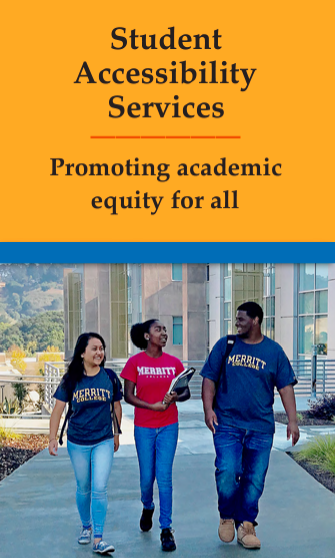The Disability Services Program at Merritt College has noticed a marked increase of students accessing services that have diagnosed mental health disabilities. Many other students that come to our office may not yet have a documented mental health diagnosis, but they are evidencing symptoms. These disabilities and/or symptoms have a definite impact on academic performance and interaction with others.
The following information is meant to increase your understanding of these students and the educational implications of their disabilities/symptoms.
• Symptoms
• Types of Mental Health Disabilities and Educational Implications
• Adjustment Disorders
• Anxiety Disorders
• Mood Disorders
• Personality Disorders
• Eating Disorders
• Instructional Strategies
Symptoms:
While a single symptom or isolated event is rarely a sign of mental illness, a symptom that occurs frequently, lasts for several weeks, or becomes a general pattern of an individual’s behavior, may indicate the onset of a more serious mental health problem that requires treatment. Some of the more significant indicators of a possible mental illness include:
• Marked personality change over time
• Confused thinking, grandiose ideas
• Prolonged feelings of depression or apathy
• Feelings of extreme highs or lows
• Heightened anxieties, fears of anger or suspicion, blaming others
• Social withdrawal, increased self-centeredness
• Denial of obvious problems and strong resistance to offers of help
• Substance abuse
• Thinking or talking about suicide
Students who access Health Center Services and receive services and accommodations through the Disability Services Program and receive accommodations because of a mental health disability would have current documentation by a certified health professional verifying their disability. They would also be participating in some form of treatment intervention, either medication therapy or psychotherapy or a combination. With the student’s informed consent the Disability Services Program endeavors to work in collaboration with mental health professionals in hospitals and community agencies to ensure that students with mental health disabilities are capable of sustaining normal academic stress.
Students who evidence symptoms such as those described above, but have never been diagnosed, may be referred to a community agency, medical doctor or psychiatrist for assessment.
As faculty, providing a supportive learning environment and working closely with Health Center personnel and the Disability Services Program will be key factors to the success of students with mental health disabilities.
Types of Mental Health Disabilities and Educational Implications:
1. Adjustment Disorders:
• This disorder develops in response to particular stressor
• If treated, complete recovery is anticipated to occur within a 6 month period.
Educational implications could include:
• Loss of initiative to attend class or complete homework assignments
• When accompanied with depression or anxiety learning may be temporarily impacted in ways similar to anxiety and depressive disorders (see below)
• Inappropriate interactions with others (i.e. may be belligerent)
2. Anxiety Disorders:
• This would include disorders in which the major feature is anxiety
• Types include: panic disorders, agoraphobia, specific phobias, obsessive-compulsive disorder, posttraumatic stress disorder, generalized anxiety disorder
Educational implications could include:
• Student may be afraid/anxious of school activities such that he/she fails to attend class, or keep scheduled appointments
• High anxiety can paralyze the ability to think and act
• Student may respond physically such as becoming ill or highly agitated
• High anxiety can cause physical responses that inhibit learning (the material is not absorbed and/or recalled)
• When anxiety is high, the student is more likely to respond with anger and aggressiveness or to withdraw
• The student with high anxiety is more susceptible to the consequences of fatigue than the average student
3. Mood Disorders:
• These disorders can be acute, severe, and of relatively short duration, or they can be chronic conditions
• The types include major depressive disorder, dysthymic disorder, bipolar disorder, cyclothymic disorder and substance induced mood disorder
Educational implications could include:
• Lack of energy or desire to perform
• Not able to think or act quickly
• Sadness or mania makes others uncomfortable
• Many symptoms cause physical discomfort (such as lack of appetite leading to poor eating/self care)
• Lowered self esteem, resulting in negativism
• Difficulty concentration
• Poor motivation
• Side effects of medication can include blurred vision, drowsiness and restlessness
4. Personality Disorders:
• These disorders are characterized by a pattern of inner experience and behavior that deviates markedly from the expectations of the individual’s culture
• They are pervasive and inflexible
• Leads to distress or impairment
• Typically start in adolescence or early childhood
• Can become stable over time
• Types include paranoid, schizoid, schizotypal, antisocial, borderline, narcissistic, avoidant, dependent and obsessive-compulsive personality disorders
Educational implications could include:
• Difficulties with relationships
• Others become easily frustrated with them
• Often feel “punished” without knowing why
• Difficulty trusting people
• May be manipulative and blame others
• Crisis is often occurring
5. Eating Disorders:
• These disorders are characterized by anxieties about weight gain
• There can be long term, irreversible consequences which can affect one’s physical and emotional health
• Types include anorexia nervosa and bulimia nervosa
Educational implications could include:
• Absences from school for treatment of health problems because of eating habits
• Side effects of malnutrition such as lethargy, forgetfulness, poor judgment, and poor concentration
Instructional Strategies:
As members of the Merritt College community, you have ongoing and direct contact with students. This places you in a position to potentially identify students who are struggling with personal or academic issues. As faculty, you may notice significant changes in a student’s work habits, behaviors, performance and attendance such as: frequent absences; low morale; disorganization in completing school work; lack of cooperation or a general inability to communicate with others; frequent complaints or evidence of fatigue; problems concentrating, or making decisions, or remembering things; missed deadlines, poor exam grades; decreased interest or involvement in class topics or academics in general. People who experience problems such as those mentioned above may simply be having a bad day or week, or may be working through a difficult time in their lives.
A pattern that continues for a long period may, however, indicate an underlying mental health problem. These students should be referred to the Health Center and the Disability Services Program. Your willingness to respond to these students will, of course, be influenced by your own personal style and your own philosophy about the limits of responsibility in assisting students. As well, a student’s openness to assistance, and such factors as class size, length and depth of your relationship, and the location of the contact, all have an impact on the type of interaction you can have with a student.
Other than referring students to the Health Center and the Disability Services Program, consider the following as possible strategies for supporting students with mental health diagnoses and/or symptoms:
• Provide explicit guidelines for assignments
• Minimize distractions in the learning environment
• Deal immediately with any negative behavior by peers towards the student
• Permit students to leave the classroom if anxiety becomes unmanageable
• Provide copies of your notes to cover emergency absences
Faculty should also feel free to call the Health Center and the Disability Services Program should they wish to consult about a situation. Specific student information, however, cannot be discussed without the student’s informed consent.
Academic Accommodations:
Students with disabilities are expected to meet the entrance requirements of their program and accomplish the core competencies to be successful in their programs. To achieve this, accommodations are provided, under Human Rights legislation, to minimize or eliminate any disadvantage their disability presents. Accommodations are unique to each individual.
The Disability Services Program makes recommendations for accommodations based on confidential documentation that the student provides. Some of the most commonly provided academic accommodations for students with mental health disabilities are:
• Private space when writing exams
• Additional time to write exams as determined by DSP
• Alternative evaluation procedures (e.g. oral exams)
• Regular tutorial services
• Provision of a note taker for lectures
• Reduced course load
Also, as is available to all Merritt College students, on-going counseling services and a variety of workshops are provided. Please refer to our current workshop schedule.
Additionally, in the past few years the community colleges have been seeing more students who have a history of a psychological disability. While the vast majority of these students are stable and show no symptoms, others may have fluctuations in behavior and performance. Some may experience medication side effects or develop problems at college because they have ceased taking their medication or take their medications inconsistently. Other students may be experiencing emotional difficulties for the first time. It is important to remember that these students have as little control over their disabilities as do students with physical disabilities.
As is the case of students with other invisible disabilities, students with psychological disabilities are often hesitant to disclose their disability. They may go to great lengths to hide their difficulty due to fear of the stigma that often comes with disclosure. It has been the experience of the DSP staff that most students with psychological disabilities are not disruptive. Usually students with this type of disability who self-identify with DSP have been in therapy or are under medical treatment.
Definition:
According to Title 5, psychological disability means a persistent psychological or psychiatric disorder, or emotional or mental illness.
A psychological disability must be verified by an appropriately licensed or certified professional (licensed psychologist or psychiatrist), and the accommodations for the students with psychological disabilities must adhere to disability-related support services defined in Title 5 regulations and may not include psychotherapy.
Characteristics might include:
• Poor concentration
• Difficulty tolerating stress
• Episodes of lower level academic performance
Possible Accommodations:
• Academic support
Alternative testing (extended time, reader, scribe, distraction reduced setting, and/or computer)
• Note-taking assistance
• Textbooks in audio format
To arrange for an appointment with a DSP Counselor:
Download the Disability Verification Form.
• Fill it out.
• Call 510-436-2429 or drop by R-109 to make an appointment.
• Bring completed form(s) to your appointment.
• Bring supporting documentation on disabilities to your appointment.
Downloads:





